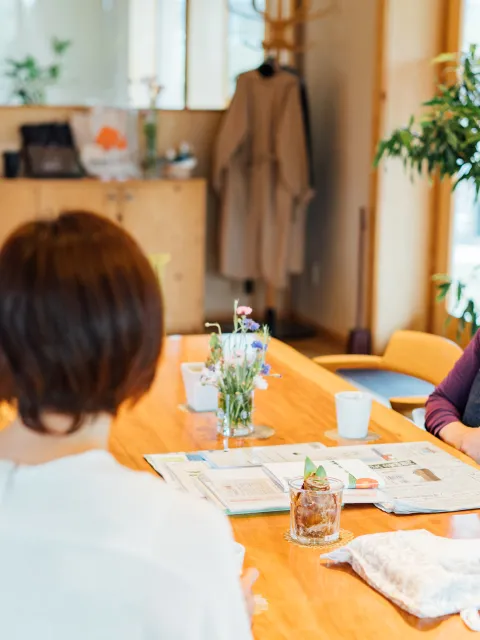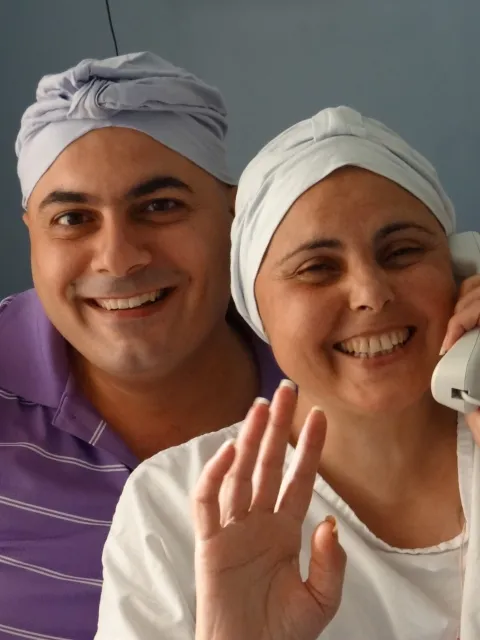Patient-centred care for cancer at 92 – interview with Guadalupe Contreras
UICC had the privilege of speaking with Guadalupe Contreras from Mexico, who was diagnosed with ovarian cancer two years ago at the age of 90. She speaks about the care she has been receiving and her experience with cancer at an advanced age.

92-year-old Guadalupe Contreras (top right) surrounded by her children, grandchildren and great-grandchildren who provide invaluable support to her as she manages her ovarian cancer.
HIGHLIGHTS
- Guadalupe Contreras, a 92-year-old ovarian cancer patient from Toluca, Mexico, shares her experiences and coping mechanisms after being diagnosed with cancer at an advanced age.
- Guadalupe feels fortunate to have an excellent support system consisting of her family, friends, and healthcare providers who have helped her stay positive and cope with the treatments' side effects.
- She benefits from patient-centred care that considers her emotional, social, psychological as well as physical needs. Age was not a deciding factor in her treatment plan, but rather her physical strength, mental wellbeing and quality of life.
Guadalupe Contreras has been living in Toluca, Mexico for some 60 years. She was born in 1932 – a year before UICC was formed.
Two years ago, she discovered a lump in her neck. Her initial reaction to her cancer diagnosis, at the age of 90, was one of shock and fear, and she is unable to hold back the tears as she talks about this moment. She felt she was too old to have cancer and was worried about how her children would take the news, but decided she had to face the diagnosis head-on and stay strong for her family.
“I did three years of technical training after primary school, but never worked in the field. I got married, I have four children, two sons and two daughters, nine grandchildren and eight great-grandchildren. I idolise them!”
Guadalupe feels extraordinarily fortunate to be able to rely on an amazing support system – her children and grandchildren, her neighbours, the church community, as well as, of course, her doctors and the rest of the care team at Instituto Nacional de Ciencias Médicas y Nutrición Salvador Zubirán, where she receives care and treatment for her cancer.
She credits her support system for helping her stay positive and able to cope. It has been particularly important, since her husband passed away six years before her diagnosis, an event she returned to often in the interview.
Guadalupe was prescribed a treatment that includes chemotherapy and radiation, often leaving her very tired. “There have been several side effects, including hair loss,” she says. “But the fatigue has been the most difficult to manage physically.” Nevertheless, she feels that the treatments have been helping her.
“I see a lot of different doctors, not just oncologists. A gerontologist, a physical therapist, a cardiologist, a dentist even. And a nutritionist.” This is an example holistic, patient-centered supportive care that takes the whole person into account, emphasising the importance of addressing the physical, emotional, psychological and social needs of patients as they undergo cancer treatment.
The treatments have also exacted an emotional toll, inducing anxiety and depression. She stays positive by focusing on her hobbies and interests: walking, cooking, gardening and reading – and even home biking! Her faith has also been essential in allowing her to cope. “I believe everything happens for a reason. Cancer has helped me appreciate life more.”
Guadalupe encourages anyone with cancer to stay positive and not give up hope, even during the darkest moments. She believes that patients should surround themselves with people who will uplift them, make them life. “It is important to maintain mental health and not be afraid to seek help.”
Her age itself was never an issue in any decision-making process, Guadalupe says. Only her physical strength, her mental wellbeing and her own desires as to what she wanted in terms of outcome and quality of life, were considered.
As if to demonstrate, she teases her attending physician who has joined the interview: Dr Enrique Soto-Pérez-de-Celis, is a Researcher in Medical Sciences at the Department of Geriatrics of the Instituto Nacional de Ciencias Médicas y Nutrición Salvador Zubirán – and a UICC Young Leader – who has written extensively about the particular needs of older adults with cancer.
“Every time I came for a medical visit, Dr Soto told me ‘you are so beautiful, you wear your most beautiful clothes.’ And I would laugh and say, ‘it is important for me to stay beautiful.”
Last update
Tuesday 25 April 2023
